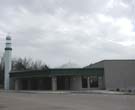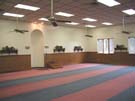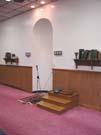back to Gallery Mainpage
Islam
The
Islamic tradition begins with the prophet Muhammad, whom
Muslims believe was the last in a long line of prophets
sent by Allah to bring God's truth to humanity. These prophets
included Abraham, Moses, and Jesus in the Jewish and Christian
traditions. Since Judaism, Christianity, and Islam all share
respect for the Torah, they are known together as people
of the Book. The prophet Muhammad was born about 570 C.E.
in modern day Saudi Arabia and in 610 C.E. began receiving
the words of Allah (God) through revelations from the angel
Gabriel. He was instructed to spread this message to all
who would listen and continued to be given these words (later
codified as the Qu'ran, or the primary holy scripture of
Islam) until shortly before his death in 632 C.E. Muhammad
is regarded as a model for the ideal person. His thoughts
and actions are recorded in the Hadith-a blueprint for the
application of the Qu'ran within daily life. Muslim faith
consists of five core practices, or the Five Pillars of
Islam. These acts are required of all Muslims and include:
a brief expression of faith ("There is no God but Allah,
and Muhammad is the Prophet of Allah"); prayer offered
five times daily while facing the holy city of Mecca; fasting
during the holy month of Ramadan; the hajj, or a once-in-a-lifetime
pilgrimage to Mecca (if possible); and the giving of alms
to those in need. Today Islam is second only to Christianity
in its number of worldwide followers and consists of two
primary subgroups-Sunni (which comprise the vast majority
of adherents) and Shia Muslims.
Both the Qu'ran
and the Hadith emphasize the connection between spirituality
and health. Muslims believe that they are better able to
withstand suffering if they possess a strong relationship
with God, commit themselves to adhering to Qur'anic commandments,
and model the teachings of the Prophet Muhammad. Acting
upon these injunctions, Muslims were among the first in
the world to build hospitals to insure more effective care
for the sick. Taken in their entirety, the Five Pillars
of Islam address all facets of health. The first and second
Pillars provide the basic prayer necessary to foster and
maintain spiritual health and guidelines for its use. Ablutions,
or ritual cleansings, always accompany these prayers and
thus prepare one's body for divine entreaty. The third Pillar,
pilgrimage, is an event that is vital for one's religious
development but also possesses many social components that
inculcate a sense of a worldwide community of belief. The
fourth Pillar entails an abstinence from eating, drinking,
and smoking from sunrise to sunset during Ramadan. This
practice functions as a show of devotion, but also provides
physical and mental restoration. Finally the fifth Pillar
involves a charitable tithe offered to those in financial
need and thus further unites spiritual and social health.
In
this section of the Gallery, you will find images from the
Islamic Society of Greater Kansas City (Missouri). The building
is primarily constituted of prayer halls for men and women
and thus demonstrates the importance of spiritual cultivation
within Islam. Also pictured is a mihrab, or prayer nook,
that indicates the direction of Mecca and signals the significance
of that city for all Muslims, and a clock that indicates
times for daily prayer. One can also see a site for ritual
ablutions, which further indicates the necessity of bodily
cleanliness when entering into a time of prayer. Finally,
a few exterior shots display the society's minaret, or prayer
tower. Through the verticality of this structure, Muslims
are reminded of the integral link between submission of
their will to Allah (which is the meaning of the word 'Islam')
and overall well-being.
Islamic Center of
Greater Kansas City, Kansas City, MO, 04, AK



